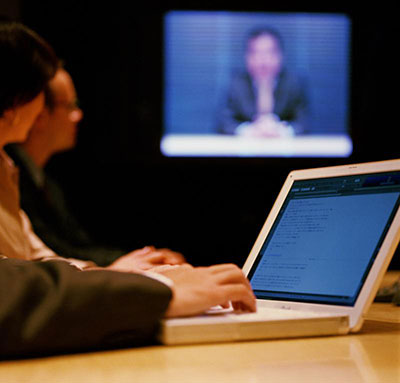
As experienced litigators know, there is no substitute for thorough trial preparation. Knowing which details to present, and when to present them, are key to successfully making a case or impeaching the testimony of opposition witnesses.
At the same time, recalling those details, especially from hours of accumulated depositions compiled over the course of months, or years, can be difficult at best. But with the help of ongoing advances in court reporting technology, attorneys now have options that can help them prepare cases more efficiently, create a more polished presentation, and thoroughly control the cross examination.
Among the best of these advanced court reporting technologies are synchronized video depositions. Potentially game-changing, synchronized video depositions feature built-in software that synchronizes video with the written transcription provided by the court reporter and legal videographer team. The benefit of this system is that attorneys can not only read the transcript on screen while watching the deposition or trial video footage, but they can also search the video record for key words and phrases at any point. This gives them the ability to quickly find important testimony or review hours of testimony for key excerpts. At trial, a litigation team can use the system to immediately locate and play back passages of important testimony to the entire court at a moment’s notice.
Linda Weber, a partner at the trial presentation service company Visual Evidence, says that synchronized depositions can help with the retention of information, especially when a jury is asked to watch a video.
“If you just put the talking head up there, it can be difficult for juries to retain the information,” said Weber. “But when you scroll the text across the bottom, they can see it and they can hear it. It really helps the jury.”
Weber has found this to be a huge advantage in business and medical malpractice litigation where the jury may be unfamiliar with terminology. In many cases, her clients will ask her to highlight specific terms or quotes so that the jury understands the importance of what was said.
Along with helping jurors retain information, synchronized video depositions are also powerful tools to impeach opposing witnesses.
“I use (synchronized video) in every trial,” said Marc Pera, a partner in the Cincinnati law firm Crandall, Pera & Wilt. “Nothing is more useful in trial than having an opposing witness impeach themselves.”
A plaintiff’s attorney specializing in medical malpractice, Pera has found synchronized video testimony to have a much greater impact on jurors than a traditional read back. The reason, he says, is that even the most compelling testimony loses its effectiveness when shared as a stenographic transcript.
As any juror would confirm, a passage read aloud from a prior deposition or testimony is often abstract and more difficult to remember. On the other hand, a video is much easier to recall, in both the short-term and the long-term when it comes time for a jury to begin deliberations.
Another drawback to the traditional read back is that it leaves room for interpretation, Pera said.
“If you’re using paper, it’s easier for a witness to say that they didn’t understand what was asked with the question,” Pera said. A video, he added, leaves little doubt.
For Pera, synchronized video depositions have become an indispensable tool, and he can point to specific cases where synchronized video depositions helped him to win cases for clients. One example in particular, he said, was a medical malpractice case in which a client underwent a surgical procedure and the doctor perforated his client’s bowel without realizing it. Afterwards, Pera’s client became septic. Over the course of depositions and at trial, Pera said the doctor changed his story multiple times. But by impeaching the doctor with his own video testimony, Pera said the jury was convinced.
“In another case, I was able to impeach a surgeon several times during his first day of testimony,” Pera said. “His team settled the next day.”
The benefits of synchronized video depositions extend beyond the courtroom, too. A powerful tool for case preparation, it offers the ability to quickly reference testimony when preparing for examination of witnesses.
Whether for trial preparation or in trial, Pera says the results synchronized video depositions offer should not be discounted.
Said Pera, “I think it’s an invaluable tool. I have no doubt that it helps.”
Synchronized video transcripts and streaming transcriptions are just two of the new advances in court reporting technology that can help with case preparation. To learn more about options available in the Cincinnati, Dayton and Columbus, Ohio areas from Mike Mobley Reporting, contact us for a consultation.
This article was also published in the April 2016 issue of The JCR (The Journal of Court Reporting).